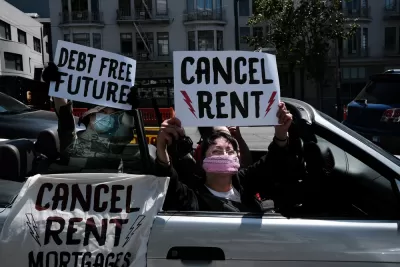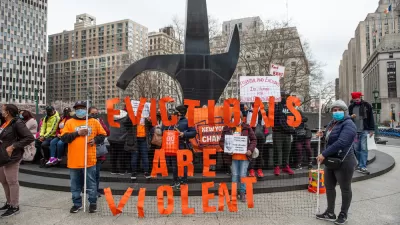The National Equity Atlas has been tracking national rent debt, which takes on new meaning since the federal eviction moratorium expired at the end of July.

Throughout the pandemic, a series of clashing data points has hung over the country like a dark cloud ready to burst. Millions of renters and property owners struggled to pay bills, falling behind on payments and racking up debt and arrears. Eviction moratoria in place at various levels of government around the country proved only sporadically effective (and frequently illegal). At the same time, poverty dropped by record levels and low-wage jobs all over the country are reportedly understaffed, presumably at least in part because people have better options. Yet, homelessness has also spiked at "devastating" rates, according to data released by the U.S. Department of Housing and Urban Development in July.
An article by Jillian Berman keeps the focus on the rent debt that has new consequences since the expiration of the federal eviction moratorium, estimating that 6.4 million households owe an estimated $21.3 billion in rent debt. The data comes from analysis of June 23 – July 5, 2021 Census Household Pulse Survey by the National Equity Atlas. '
The National Equity Atlas has created a dashboard of interactive maps and infographics to track mounting rent debt and the potential of mass evictions as "one of the most pressing equity issues created by the pandemic." The National Equity Atlas calls on policymakers to eliminate rent debt and prevent evictions.
As noted by Berman, rent debt pre-dates the pandemic, but Covid-19 likely exacerbated the problem. Although previous economic relief packages approved by the federal government have devoted $46 billion worth of rent relief funds to the growing challenge, relief funds are reaching struggling renters too slowly to effectively mitigate the risk in the rental housing market.
FULL STORY: The looming $21.3 billion in debt that could cost Americans their homes

Planetizen Federal Action Tracker
A weekly monitor of how Trump’s orders and actions are impacting planners and planning in America.

Maui's Vacation Rental Debate Turns Ugly
Verbal attacks, misinformation campaigns and fistfights plague a high-stakes debate to convert thousands of vacation rentals into long-term housing.

Restaurant Patios Were a Pandemic Win — Why Were They so Hard to Keep?
Social distancing requirements and changes in travel patterns prompted cities to pilot new uses for street and sidewalk space. Then it got complicated.

In California Battle of Housing vs. Environment, Housing Just Won
A new state law significantly limits the power of CEQA, an environmental review law that served as a powerful tool for blocking new development.

Boulder Eliminates Parking Minimums Citywide
Officials estimate the cost of building a single underground parking space at up to $100,000.

Orange County, Florida Adopts Largest US “Sprawl Repair” Code
The ‘Orange Code’ seeks to rectify decades of sprawl-inducing, car-oriented development.
Urban Design for Planners 1: Software Tools
This six-course series explores essential urban design concepts using open source software and equips planners with the tools they need to participate fully in the urban design process.
Planning for Universal Design
Learn the tools for implementing Universal Design in planning regulations.
Heyer Gruel & Associates PA
JM Goldson LLC
Custer County Colorado
City of Camden Redevelopment Agency
City of Astoria
Transportation Research & Education Center (TREC) at Portland State University
Jefferson Parish Government
Camden Redevelopment Agency
City of Claremont




























